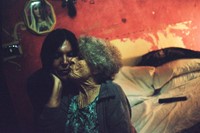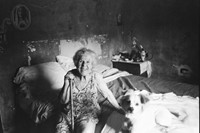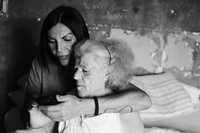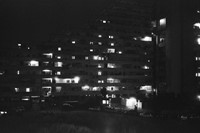As her exhibition, Anime Salve, opens in Naples, Jess Kohl tells the story behind her ongoing series depicting trans women and gender-nonconforming individuals in the Neapolitan suburb of Scampia
“I want these images to feel really empowering and celebratory,” says Jess Kohl of her ongoing project documenting trans and gender-nonconforming individuals in Scampia, Italy. The photographer and director has been working on the series for the last two years, with the intention of creating a feature-length documentary on the community in the Naples suburb. “It’s become quite sprawling in its themes,” she explains. This week, a series of photographs go on show in an exhibition entitled Anime Salve, marking Kohl’s first solo show in Italy.
The area of Campania and Neapolitan culture has a history of celebrating gender-nonconforming individuals, stretching back to people known as ‘femminielli’, men who chose to traditionally feminine ways of expressing their gender idenitities. The acceptance of the ‘femminielli’ interested Kohl, who has explored what the trans and gender-nonconforming community in Scampia face today. “I always seek to work with subjects where there is a common desire to tell their stories – without this, projects can feel quite unfulfilling and self seeking,” she explains. “I think as a queer person, I have a certain kinship with different pockets of LGBT communities globally, which allows me to immerse myself deeper into projects.”
Kohl chose to draw on the area’s history of admiration for the ‘femminielli’. As such, she likens her photographs to depictions of religious icons in Naples. “Around the city and in people’s homes, there are many shrines dedicated to certain saints, mixed in with photographs of deceased loved ones,” she explains. “The colours, textures and compositions of these images are intended to reflect that – to immortalise these individuals, and celebrate them in the way they would have been historically appreciated in Campania.” Here, Kohl tells the story behind the series, the suburb of Scampia’s unique recent history and the present day reality of the queer community that lives there.
“I was first drawn to Napoli after finding out about the the history of the ‘femminielli’, one of the oldest examples of what is now known as non-binary. In Neapolitan traditions, ‘femminielli’ were effeminate men, celebrated in the Campania region since the 19th century. They were believed to bring good luck. I wanted to find out if these historically liberal attitudes towards gender nonconformity had bled into modern Neapolitan society. On my first visit to Naples, I met gender-nonconforming individuals from all over the city, of all different ages, but the individuals I felt most compelled by where a group of older trans women living in Scampia, a ‘bedroom suburb’ in the far north of Naples. I was particularly drawn to Alessia and Amalia, a trans woman and her mother living high up in a tower block in the area, and have spent the last couple of years returning to spend time with them and document their relationship, using both still and moving images.
“Scampia was built in the 1960s and 70s as a kind of utopian housing project, with huge tower blocks constructed in the shape of sails and with walkways that were meant to reflect the communal streets of the old Spanish Quarters in the centre of the city. When the great earthquake happened in the 1980s, many people were displaced and began squatting the buildings before they were meant to be habitable. Abandoned by the state, the area was taken over by the Camorra, the local mafia, and became a breeding ground for drugs and crime. I think that although historically, attitudes towards queer people were accepting in Campania – and this has bled into modern society in certain ways – over time, queer people have been pushed to the margins, and this is why I found a community of trans women living in Scampia, geographically isolated from the mainstream, the rest of the city.
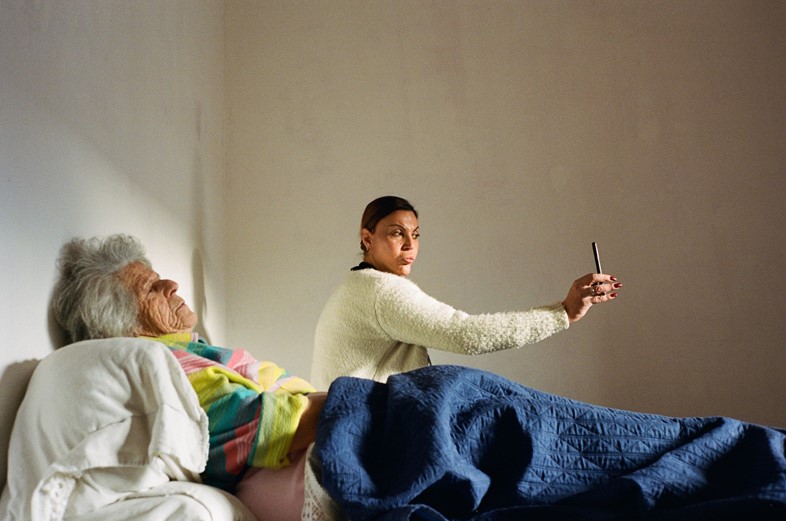
“I first visited to meet Carmen, one of the people in my series, at her home. I was familiar with the area from seeing the film Gomorrah years ago, but I hadn’t travelled there intentionally to seek it out, so it was really breathtaking to see these huge Brutalist buildings suddenly dominating the landscape. They are very complex buildings, and the residents are quite divided on their feelings towards them. They have housed so much trauma in their walls, yet many people grew up here and have fond childhood memories. Scampia is usually sensationalised for crime and drugs in the media, and I wanted to offer an alternative perspective on the area – to show humanistic, universal relationships and experiences instead.
“Representing communities outside of my own always comes with different sets of challenges and a courtesy of care to the people whose lives and homes I’m entering. I think the longer I spend with people, the less of an outsider I become, and as a result the images feel more intimate and less staged. This is true for the photographs I have made of Alessia. In our first meeting, she’s lying on a bed, posing in a sexualised way that is true to how she is used to being depicted and viewed. As the series progresses, we see her more naturally at home, lying on her bed with her mother, embracing her mother.
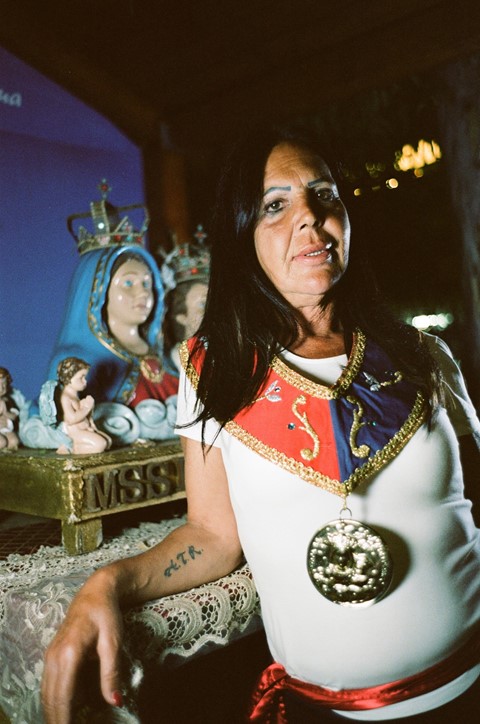
“The landscape of Scampia is changing, as it was announced last year that one of the remaining ‘Sails’ was being torn down. This encouraged me to continue this project, to continue to document these individuals as the landscape around them changes – at the same time, the relationship between Alessia and her mother changes, as her mother grows older and needs more looking after. Attitudes towards gender nonconformity still feel refreshingly liberated in Naples – feminine men and masculine women are much more present in the fabric of society than elsewhere in Europe.
“One thing that struck me about the queer community here is their integrity. There is a strong connection with tradition, which is very rich in the Campania region, both religious and cultural, and this is of utmost importance to the community. Neapolitan people in general are fiercely proud of their city, almost protective of it. Respecting this feels incredibly important.”
Anime Salve is at PAN (Palazzo delle arti Napoli), Naples from September 11 – 20, 2020


